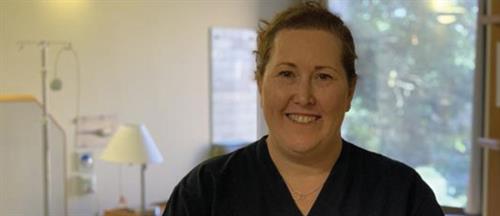Helping patients live the best life they can

The road to becoming a Nurse Practitioner (NP), the most senior level of clinical nurse, is extensive and viewed as a privilege by Nurse Practitioners. Each Nurse Practitioner has a different story, paving their own way so that all patients and future generations can have access to quality health care. #npourstory
A reflection from The Wesley's Nurse Practitioner Nicole Hutchinson:
I am a Nurse Practitioner (NP) working in The Wesley Hospital Palliative Care Service seeing patients in both the palliative care ward, as well as consultations with patients in other wards throughout the hospital. I work with the palliative care team – medical staff, nurses, allied health staff, nurse counsellors and pastoral care to ensure appropriate person-centred care occurs for the palliative care patient from admission, through until discharge or end of life. This care may entail symptom management, referral to services, support and end of life care.
I am the first NP employed at The Wesley Hospital. This is my first role as a NP and I have been here for 19 months.
An NP is a registered nurse with advanced nursing practice and legislated to have an advanced scope of practice working autonomously and independently with a collaborative relationship with the medical team. An NP can diagnose illness, prescribe medications, order and interpret diagnostic tests, refer to other specialists, teams and services, manage and review patients. With this ability I am able to support the palliative care specialists in triaging new admissions/referrals and following patients that have less complex palliative care needs. Having come from a background of working with motor neurone disease (MND) patients for over 14 years, I have a special interest in non-malignant life-limiting conditions and try to offer further expertise and support to these areas.
What I love about my job is my extended scope of practice to help support people, while maintaining my connection to people as nurses do. I have the ability to help patients and their families at their most vulnerable and support them through the disease trajectory whether they are discharged home or until end of life. It is very satisfying to help relieve someone’s suffering, whether it be their pain or breathlessness and reassure them that we can manage to make them comfortable until the end of their life. And hugs…you have no idea the power of hugs and touch. As a nurse, you often have this opportunity to spend so much time with people, and there is a level of closeness that we have always had as a profession and I am grateful I still have this as part of my role. This however has been terribly difficult in the current environment with COVID-19.
Palliative care remains an area where most people automatically believe if they are referred to ‘palliative care’ they are going to die. Many of our patients go home for periods, or stay at home from weeks, months and sometimes years. But yes, they also may die in hours to days or weeks.
Palliative care is not just about dying, but about living the best life you can, comfortably with good symptom management, supports and dignity, until the end…whenever that may be.














